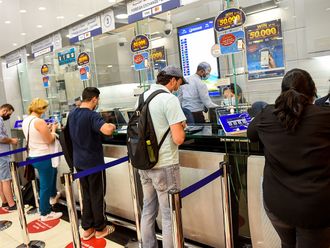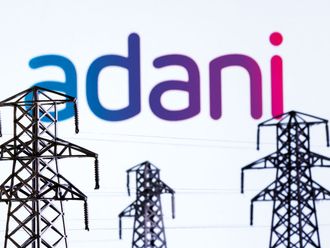Singapore: Asian stocks fluctuated last week with oil companies dropping on concern China's measures to slow inflation will damp demand, while Japanese carmakers rose as the yen weakened, boosting the earnings prospects for exporters.
China Petroleum and Chemical Corp., the nation's biggest refiner, dropped 5.7 per cent in Hong Kong. China Vanke Co., the country's biggest developer, fell 3.4 per cent in Shanghai. Bank of China Ltd., the nation's third-biggest lender, dropped per cent 5.3 per cent. Toyota Motor Corp., the world's biggest automaker, rose 5.5 per cent, while Sony Corp., the maker of Bravia televisions, jumped 7.5 per cent as data showed the US economic recovery is accelerating.
"Investors are weighing up their options in a rapidly changing global macro-economic environment," said Tim Schroeders, who helps manage about $1 billion at Pengana Capital Ltd. in Melbourne. "We may well be headed for another period of consolidation as investors move to lock-in gains against a backdrop of rising uncertainty in the near term."
The MSCI Asia Pacific Index declined 0.3 per cent to 131.72 last week, following a 2 per cent drop last week. Concern over how China will tackle the fastest inflation in two years triggered a global stock rout that wiped more than $1.7 trillion off global equities since the start of last week.
Australia's S&P/ASX 200 Index fell 1.4 per cent. Hong Kong's Hang Seng Index sank 2.6 per cent. The Shanghai Composite Index tumbled 3.2 per cent, the most among the region's major benchmark indices, on speculation measures to curb inflation including price controls and higher interest rates may hurt earnings.
Japan's Nikkei 225 Stock Average advanced 3.1 per cent as the yen dropped to a six-week low against the US dollar, boosting the value of the nation's overseas sales when converted into the local currency.
Price controls
China may impose temporary price controls to counter the fastest inflation in two years, the government said November 17. Price caps on "important daily necessities" and production materials will be used if necessary, the State Council said.
The People's Bank of China may raise borrowing costs as efforts to cool inflation with subsidies, sales of food reserves and price controls are likely to prove insufficient, said analysts surveyed by Bloomberg News.
Concern that rising consumer prices, which surged the most in two years in October, will undermine the economy spurred Premier Wen Jiabao to hold a cabinet meeting on the issue last week.
The MSCI Asia Pacific Index gained on the last two days of the week, countering a loss of 1.7 per cent earlier, after reports showed the economic recovery in the US is accelerating and on speculation a bailout for Ireland will prevent a spread of the nation's banking crisis.
Irish Finance Minister Brian Lenihan said the government may accept aid from the EU and International Monetary Fund. Reports in the US last week showed fewer workers than forecast filed for jobless benefits, and October sales at the nation's retailers increased by most in seven months.
The MSCI Asia Pacific Index has increased about 9.6 per cent this year. Stocks in the Asian benchmark are valued at an average of about 14.6 times estimated earnings.












